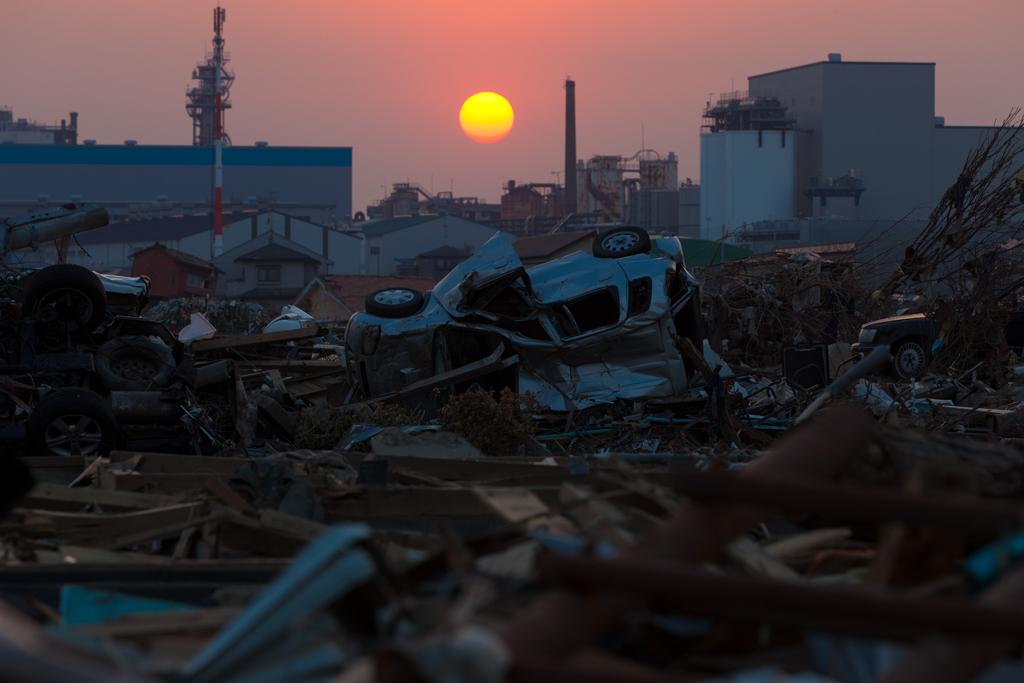Japan: Inside the Fukushima disaster zone
The sun sets on April 13, 2011, over debris still piled up nearly five weeks after the earthquake and tsunami disaster devastated the city of Ishinomaki in Miyagi prefecture.
FUKUSHIMA, Japan — When night falls inside the 12-mile evacuation zone around the Fukushima Dai-ichi nuclear plant, a few homes in the otherwise dark, deserted landscape begin to glow.
On closer inspection, the glow turns out to be from light switches that were left on when owners hurried from their homes amid power outages and the deteriorating situation at the nearby reactors.
Radiation has been leaking from the stricken power plant since a March 11 earthquake and tsunami hit northeast Japan. The Tokyo Electric Power Co. (TEPCO), which runs the plant, said Friday that the tens of thousands of households who were ordered out of the 12-mile evacuation zone will be offered compensation to the tune of $12,000.
Although the radiation released at Fukushima is so far only one-tenth that released by Chernobyl, it has been placed on par with the Soviet reactor in terms of severity. The saga in Japan is far from over.
Within the evacuation zone, piles of laundry sit where they were left. Plates and bottles lie strewn across kitchen tables. As people rushed to flee, they left behind them scenes frozen in time, and numerous aftershocks in the area have since knocked over furniture and scattered belongings.
Down one backstreet, a row of vending machines, ubiquitous in Japan, offers drinks and cigarettes. Eerily enough, the machines are still working: The canned coffee is still hot and the juices are still cold.
Apart from the occasional busload of emergency workers dressed in hazmat suits, one of the only signs of life are a few roaming, stray cats and dogs.
Emergency workers have a dormitory inside the zone. Buses take them to the plant, where they work in shifts to try to prevent a full nuclear meltdown.
The road the emergency crews take to the plant has been repaired, but other roads have been left in the various states of disrepair, with cones marking dangerous spots for the few cars that brave them.
The carcass of a cow lies where it fell. In a nearby enclosure, five or so cattle are lucky enough to graze and have enough water to sustain themselves. Perhaps their owner has made visits back to tend them; there is nobody around to ask.
Toshimi Oowada lived in Tomioka Town, six miles from the plant, until March 12 when a hydrogen explosion occurred at the Fukushima plant. As soon as he heard there was radiation spewing into the atmosphere, he jumped into his car with his wife, two young sons and their cat and dog. They fled in the clothes they were wearing.
His house is well inside what locals have dubbed the "Red Zone" — where the government is about to enforce compulsory evacuation orders on the very few who remain. Recently, he returned to the town in which he was born and raised to retrieve some of his family's possessions.
“We left as quickly as we could so we couldn't take anything with us. I had to come back to get things like banks books and some important documents as soon as possible,” Oowada said.
“Today is the third time I've been back, this time to get some plates, some mementos and things for the kids.”
He stays in the zone for a maximum of a couple of hours and gets screened for radiation after every visit at the public Sogo Gymnasium in Koriyama City, 40 miles away.
The old gray concrete sports hall, which suffered some damage during the earthquake, is also being used as an evacuation center.
“So far we've screened about 22,000 people,” said a firefighter from the Koriyama fire service helping to administer radiation tests. “In the early days after the explosion at the nuclear plant we had a lot of people with high readings, but nobody is showing any real signs of contamination now.”
Despite testing for nothing above normal background levels of radiation, Oowada says he wouldn't take his children into the zone and has no idea when, if ever, he may able to return to live in his house.
However, he was reluctant to criticize the company, TEPCO, that provided employment, in one way or another, for 60 percent of his town. “The truth is, we all had food on our table thanks to TEPCO for all these years,” he said.
“I'd like Tokyo Electric Power Co. to provide more information about what is going to happen to my hometown,” he added. “Even if it's going to be decades until we can go back, I want to know.”
Every day, reporters and producers at The World are hard at work bringing you human-centered news from across the globe. But we can’t do it without you. We need your support to ensure we can continue this work for another year.
Make a gift today, and you’ll help us unlock a matching gift of $67,000!
